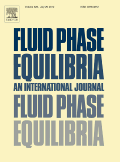
FLUID PHASE EQUILIBRIA
Scope & Guideline
Fostering Innovation in Physical Chemistry
Introduction
Aims and Scopes
- Phase Equilibrium Studies:
The journal extensively covers research related to phase equilibria in various systems, including gas-liquid, liquid-liquid, and solid-liquid equilibria, providing insights into the thermodynamic behavior of complex mixtures. - Thermodynamic Modeling:
It emphasizes the development and application of various thermodynamic models (such as cubic equations of state, SAFT, and activity coefficient models) to predict the properties of fluids and their mixtures under different conditions. - Experimental Investigations:
Numerous studies involve experimental measurements of phase behavior, solubility, and other thermophysical properties, contributing to a better understanding of fluid dynamics in industrial applications. - Ionic Liquids and Deep Eutectic Solvents:
The journal highlights the increasing importance of ionic liquids and deep eutectic solvents in separation processes, energy storage, and environmental applications, promoting research in innovative solvent systems. - Machine Learning Applications:
There is a growing trend of incorporating machine learning techniques for predicting thermodynamic properties, enhancing the efficiency of property estimations and modeling. - Hydrate Formation and Stability:
Research on gas hydrates, particularly their formation, stability, and dissociation behavior, is a key area, reflecting the importance of hydrates in energy and environmental contexts.
Trending and Emerging
- Ionic Liquids and Deep Eutectic Solvents:
Research focusing on ionic liquids and deep eutectic solvents is rapidly increasing, highlighting their application in green chemistry and separation processes, which aligns with global sustainability goals. - Machine Learning and AI in Thermodynamics:
The incorporation of machine learning and artificial intelligence techniques for predicting thermodynamic properties and phase behavior is a significant emerging trend, enhancing modeling efficiency and accuracy. - Gas Hydrate Research:
There is a growing interest in the study of gas hydrates, particularly in relation to energy storage and environmental applications, leading to innovative approaches in their modeling and experimental investigation. - Complex Mixtures and Non-Ideal Systems:
The journal is increasingly focusing on the behavior of complex mixtures, including multi-component systems and non-ideal interactions, which are crucial for various industrial applications. - Sustainable and Green Chemistry:
Research emphasizing sustainable practices, including the use of renewable solvents and environmentally friendly processes, is becoming a prominent theme, reflecting the industry's shift towards greener solutions.
Declining or Waning
- Traditional Solvent Systems:
Research on conventional solvent systems is becoming less prominent as the focus shifts towards more sustainable and innovative solvents like ionic liquids and deep eutectic solvents. - Basic Fluid Properties:
There is a noticeable decline in studies exclusively focused on fundamental properties of simple fluids, as the journal increasingly emphasizes complex mixtures and interactions. - Hydrophobic Interaction Studies:
Research specifically addressing hydrophobic interactions in simple systems is waning, potentially overshadowed by more complex studies involving ionic liquids and deep eutectic solvents. - Empirical Correlation Development:
While empirical correlations remain important, the trend suggests a shift towards computational modeling and machine learning, leading to a decrease in traditional empirical model studies. - Static Phase Equilibria:
Studies focusing solely on static phase behavior without considering dynamic processes or real-world applications are becoming less common, as the journal aims for more practical relevance.
Similar Journals

Russian Journal of Physical Chemistry A
Advancing Knowledge in Theoretical and Applied ChemistryWelcome to the Russian Journal of Physical Chemistry A, a prominent publication in the field of Physical and Theoretical Chemistry, published by MAIK NAUKA/INTERPERIODICA/SPRINGER. This journal, with ISSN 0036-0244 and E-ISSN 1531-863X, has been a vital platform for disseminating significant research findings since its inception in 1996. As a key contributor to academic discourse, it aims to provide high-quality articles that explore fundamental and applied aspects of physical chemistry, thereby enhancing understanding and innovation in the discipline. Although currently categorized as Q4 by Scopus (2023), the journal is positioned to evolve with the scholarly landscape, continually striving to improve its impact and relevance. With no open access options available, subscription to this journal is essential for those keen on enriching their knowledge and staying current with advancements in physical chemistry. Researchers, professionals, and students alike will find invaluable insights and robust discussions that can inspire their work and studies.

Archives of Thermodynamics
Exploring the Dynamics of Energy and MatterArchives of Thermodynamics is a reputable journal dedicated to the field of thermodynamics, published by the esteemed POLISH ACADEMY OF SCIENCES. With a robust history since its inception in 2003, this journal serves as a critical platform for disseminating high-quality research aimed at advancing knowledge and technology in thermodynamic systems and processes. Recognized for its contribution to the field, it holds a Q3 ranking in the Physics and Astronomy (miscellaneous) category as of 2023, with a respectable Scopus rank of #148 out of 243, placing it within the 39th percentile. Although it follows a traditional access model, the journal's commitment to scholarly excellence ensures that researchers, professionals, and students alike can benefit from its rich archives and ongoing discussions within the scientific community. Situated in Warsaw, Poland, the journal not only reflects a regional dedication to scientific progress, but also engages with global audiences interested in the evolving landscape of thermodynamic research.

Journal of Superhard Materials
Exploring the depths of material science with superhard insights.The Journal of Superhard Materials, published by PLEIADES PUBLISHING INC, is a premier journal dedicated to advancing the field of superhard materials, including their synthesis, properties, and applications. With an ISSN of 1063-4576 and E-ISSN 1934-9408, this journal serves as an essential resource for researchers and professionals focused on material science and inorganic chemistry. As of 2023, it ranks in the Q3 category for both Inorganic Chemistry and Materials Science (miscellaneous), establishing its growing significance within the scientific community. The journal, located in the United States at PLEIADES HOUSE, New York, welcomes submissions that contribute innovative findings in the realm of superhard materials, fostering collaboration and knowledge exchange among scholars. Researchers interested in cutting-edge developments and applications in this niche area will find valuable insights and findings published in this journal, encouraging continued exploration and discovery in the materials sciences.
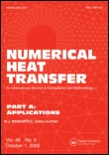
NUMERICAL HEAT TRANSFER PART A-APPLICATIONS
Pioneering research at the intersection of theory and application.NUMERICAL HEAT TRANSFER PART A-APPLICATIONS, published by TAYLOR & FRANCIS INC, serves as a premier outlet for cutting-edge research in the domains of numerical analysis and condensed matter physics. With an ISSN of 1040-7782 and an E-ISSN of 1521-0634, this esteemed journal has steadily maintained its influence in the academic community since its establishment in 1989, continuing its publication into 2024. Currently ranked in the Q2 quartile for both Condensed Matter Physics and Numerical Analysis, it stands as a vital resource for researchers committed to advancing computational methodologies and applications. The journal's Scopus rankings reflect its growing impact, particularly in mathematics, where it is placed in the top 26% of its category. Although not an open-access journal, its comprehensive research articles and detailed applications foster innovation and collaboration, making it essential for professionals and students aiming to deepen their understanding of thermal transfer phenomena through numerical techniques. This journal not only bridges theory and application but also propels forward the field of heat transfer.

DOKLADY PHYSICAL CHEMISTRY
Exploring New Dimensions in Theoretical ChemistryDOKLADY PHYSICAL CHEMISTRY is a prominent peer-reviewed journal published by MAIK NAUKA/INTERPERIODICA/SPRINGER, focusing on advancements and research in the field of Physical and Theoretical Chemistry. With the ISSN 0012-5016 and E-ISSN 1608-3121, this journal serves as a vital platform for researchers and practitioners to disseminate their findings and insights from 1996 to the present. Despite its current Q4 ranking in the 2023 category of Physical and Theoretical Chemistry, the journal has shown significant potential for visibility and engagement within the academic community, ranking #149 out of 189 in its respective field according to Scopus metrics, highlighting its dedicated readership. While the journal is not open access, it remains an essential resource for those seeking in-depth research articles, reviews, and commentary within this dynamic discipline. As the field continues to evolve, DOKLADY PHYSICAL CHEMISTRY plays a crucial role in fostering scientific dialogue and collaboration among researchers, professionals, and students worldwide.

CONTRIBUTIONS TO MINERALOGY AND PETROLOGY
Illuminating the Path of Mineralogical DiscoveryCONTRIBUTIONS TO MINERALOGY AND PETROLOGY, published by SPRINGER, is a premier journal in the fields of geochemistry, petrology, and geophysics, boasting an impressive impact factor that reflects its status as a leader in the discipline. With a history spanning from 1966 to 2024, this journal has consistently provided a platform for high-quality research that influences our understanding of earth materials and processes. Ranked in the top quartile (Q1) in both geochemistry and petrology, as well as geophysics, it stands out with Scopus rankings of #24 out of 165 in Geophysics and #37 out of 154 in Geochemistry and Petrology, indicating its critical role in advancing scientific knowledge. As a vital resource for researchers, professionals, and students alike, the journal invites contributions that foster collaboration and innovation in the study of minerals and rocks. Although it does not currently offer open access, its scholarly rigor and relevance to contemporary issues ensure it remains an indispensable part of the academic discourse within this field.
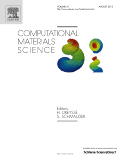
COMPUTATIONAL MATERIALS SCIENCE
Exploring the Fusion of Computation and MaterialsCOMPUTATIONAL MATERIALS SCIENCE is a prestigious academic journal dedicated to the dissemination of innovative research in the field of computational materials science, emphasizing the interplay between computational methodologies and materials engineering. Published by ELSEVIER in the Netherlands, this journal showcases high-impact articles that contribute significantly to the understanding of material properties through computational techniques. As evidenced by its 2023 Scopus Rankings, which place it in the top quartiles across multiple disciplines including Computer Science, Materials Science, and Physics and Astronomy, it is a vital resource for researchers, professionals, and students alike. With a focus on advancing scientific knowledge and practical applications, COMPUTATIONAL MATERIALS SCIENCE aims to bridge the gap between theoretical investigations and experimental validation. Explore a wealth of cutting-edge research designed to inspire the next generation of innovations in materials science through this esteemed publication.
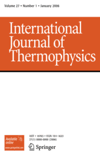
INTERNATIONAL JOURNAL OF THERMOPHYSICS
Illuminating the Path of Thermal ResearchInternational Journal of Thermophysics, published by Springer/Plenum Publishers, is a premier platform for the dissemination of high-quality research in the field of thermophysics, particularly focusing on the intricate relationships between thermal properties and their applications across various scientific disciplines. With an ISSN of 0195-928X and an E-ISSN of 1572-9567, the journal has established a respected presence in the academic community since its inception in 1980, with a converged publication timeline extending to 2024. Categorized in the Q2 quartile for Condensed Matter Physics in 2023 and maintaining impressive Scopus rankings—such as #39 in Fluid Flow and Transfer Processes and #178 in Condensed Matter Physics—the journal serves as a vital resource for researchers and professionals aiming to advance knowledge in the thermal sciences. Though not an open-access journal, it remains accessible through institutional subscriptions. The International Journal of Thermophysics is committed to fostering innovative research and interdisciplinary collaboration, ensuring that it remains at the forefront of thermophysical studies.

JOURNAL OF ENGINEERING PHYSICS AND THERMOPHYSICS
Illuminating the Path of Engineering Physics ResearchJOURNAL OF ENGINEERING PHYSICS AND THERMOPHYSICS, published by Springer, is a vital resource for researchers and professionals in the fields of engineering physics and thermophysics. With an ISSN of 1062-0125 and an E-ISSN of 1573-871X, this esteemed journal has been disseminating high-quality research since its inception, covering critical advancements in both condensed matter physics and various engineering disciplines. Despite its classification within the third quartile in both Scopus categories for 2023, the journal remains a significant conduit for innovative studies that push the boundaries of knowledge in thermal and physical engineering, with converged years spanning from 1992 to 1997 and 2004 to 2024. The journal does not offer open access, which means subscribers and institutions have exclusive access to its rich content. As the field continues to evolve, JOURNAL OF ENGINEERING PHYSICS AND THERMOPHYSICS plays an essential role in fostering scholarly discussions and supporting the academic community in tackling contemporary engineering challenges.
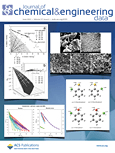
JOURNAL OF CHEMICAL AND ENGINEERING DATA
Pioneering Insights for Chemical and Engineering InnovationsThe Journal of Chemical and Engineering Data (ISSN: 0021-9568, E-ISSN: 1520-5134) is a prestigious publication by the American Chemical Society, dedicated to disseminating high-quality research within the fields of chemical engineering and chemistry. With its history dating back to 1956, the journal has evolved to encompass a wide array of topics essential to the advancement of both disciplines, reaching an impressive convergence year of 2024. Positioned in the Q2 quartile for both Chemical Engineering and Chemistry, it boasts a commendable ranking of 95th out of 273 in General Chemical Engineering and 146th out of 408 in General Chemistry, reinforcing its significance within the academic community. As a vital resource for researchers, professionals, and students alike, the journal encourages rigorous submissions that contribute to the understanding and application of chemical and engineering data, despite its traditional access model. By bridging theoretical insights with practical applications, the Journal of Chemical and Engineering Data remains an indispensable tool for those seeking to drive innovation and efficiency in the chemical sciences.